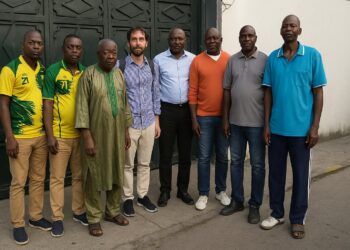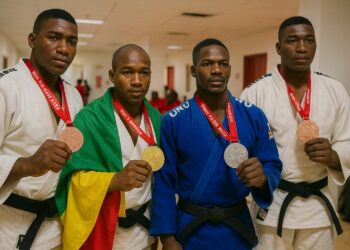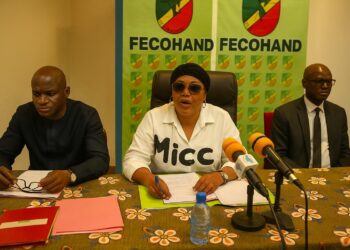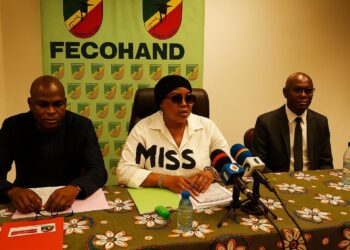National Merit Order Elevates Cultural Voices
On 15 August, during celebrations marking the Republic of Congo’s sixty-fifth Independence Day, President Denis Sassou Nguesso conferred the rank of Chevalière of the National Order of Merit upon slam artist Mariusca Moukengue, spotlighting a genre whose impact long exceeded its modest technical means.
The decoration, announced in a presidential communiqué and reported by Les Dépêches de Brazzaville, positions the thirty-two-year-old poet as an emblem of cultural diplomacy, bridging official narratives of national cohesion with the grassroots cadence of spoken-word that animates Brazzaville’s nights.
Receiving the medal on the esplanade of the Presidential Palace, Moukengue raised the ribbon to the crowd and later called the moment “a recognition of every young Congolese who works unseen,” underlining the collective dimension she attributes to personal accolades.
Slam Poetry’s Rising Resonance in Brazzaville
Slam first emerged in Congo-Brazzaville’s cafés at the turn of the millennium, yet only recently has it migrated from intimate circles to national stagecraft. Analysts attribute the shift to artists like Moukengue, whose verses braid patriotic imagery with candid social commentary (Les Dépêches de Brazzaville).
Her signature piece, “Nzoto,” juxtaposes the ache of marginalised neighbourhoods with declarations of hope, a tonal duality that scholars at Marien Ngouabi University identify as a defining feature of contemporary Congolese slam. The form thus operates both as artistic outlet and informal barometer of civic mood.
Government cultural officials, keen to diversify soft-power assets beyond rumba and soukous, have intermittently offered logistical backing. Yet the sector remains largely self-produced, a reality Moukengue addresses candidly, noting that crowd-funding and voluntary networks still underwrite her Festival International Slamouv, now preparing its fifth edition.
Festive Ceremony and Diplomatic Symbolism
The Independence Day ceremony itself blended military pageantry with civilian homage. While diplomatic guests observed columns of paratroopers, the appearance of a slam poet among the honourees signalled a nuanced messaging: social creativity is not peripheral but integral to the Republic’s strategic narrative of inclusive modernity.
“Decoration in the arts is always political,” argues cultural historian Jean-Bruno Ntsoumou, reached by phone in Pointe-Noire. He views the award as “a quiet pact between institutions and youth culture,” ensuring mutual visibility without diluting the independence that gives slam its moral clarity.
Official broadcasters highlighted Moukengue’s acceptance speech alongside footage of new infrastructure projects, a juxtaposition suggesting that artistic optimism and economic ambition form intertwined strands of the national storyline promoted by Brazzaville. Observers noted the framing but found little dissent, as the audience greeted the montage warmly.
From Local Stages to International Platforms
Moukengue’s trajectory began in 2010, reciting texts in modest community centres. Within a decade she represented Congo at festivals in Dakar and Limoges, demonstrating the exportability of locally rooted verse. Each trip, she says, “makes me love home louder,” reinforcing diasporic bonds rather than diluting them.
The forthcoming Paris concert on 29 November will test both her managerial capacity and the appetite of European audiences for Central African spoken-word. Ticketing remains self-financed, yet embassies have circulated promotional leaflets, indicating an informal synergy between state interests and artistic entrepreneurship.
If successful, the show could strengthen routes for other Congolese poets, complementing government objectives to expand cultural exports beyond the music industry. Economic planners in the Ministry of Tourism routinely cite creative performance as a sector capable of unlocking diversified revenue without heavy capital expenditure.
Vision Beyond the Medal
For Moukengue, however, figures remain secondary to pedagogy. She devotes workshop time to teenagers navigating unemployment and online misinformation, believing that “mastering speech helps master circumstance.” Her stance aligns with national youth strategies that place emphasis on entrepreneurship, civic education and digital literacy.
Observers note that by amplifying such educational framing, the presidency may accrue legitimacy among urban constituencies unsure of traditional political channels. In that sense the National Order of Merit functions not only as personal reward but as a policy instrument calibrated through cultural symbolism.
Critics of state patronage caution against co-optation, yet Moukengue insists on autonomy, describing government support as “a microphone, not a script.” The formulation resonates with peers who seek institutional platforms without sacrificing the dissonant honesty prized in slam aesthetics.
Youth Engagement and Policy Implications
Youth councils in Brazzaville have invited her to present at policy forums on employment, seeing in her journey a template for creative self-reliance. The dialogues complement ministerial programmes that promote incubators for design, coding and performance, embedding culture within a broader developmental matrix.
Diplomats monitoring Central African soft-power trends interpret the medal as part of a longer arc, from the 2015 UNESCO listing of Congo’s rumba to recent film initiatives. Each honours sphere specific talent while collectively projecting an image of stability conducive to investment and tourism.
As dusk settled over Brazzaville that Independence Day, fireworks sketched fleeting verses above the Congo River, echoing the spoken lines that had earned Moukengue her new title. Whether on city skyline or concert stage, the poet’s mission continues: translate private resilience into public resonance.












































